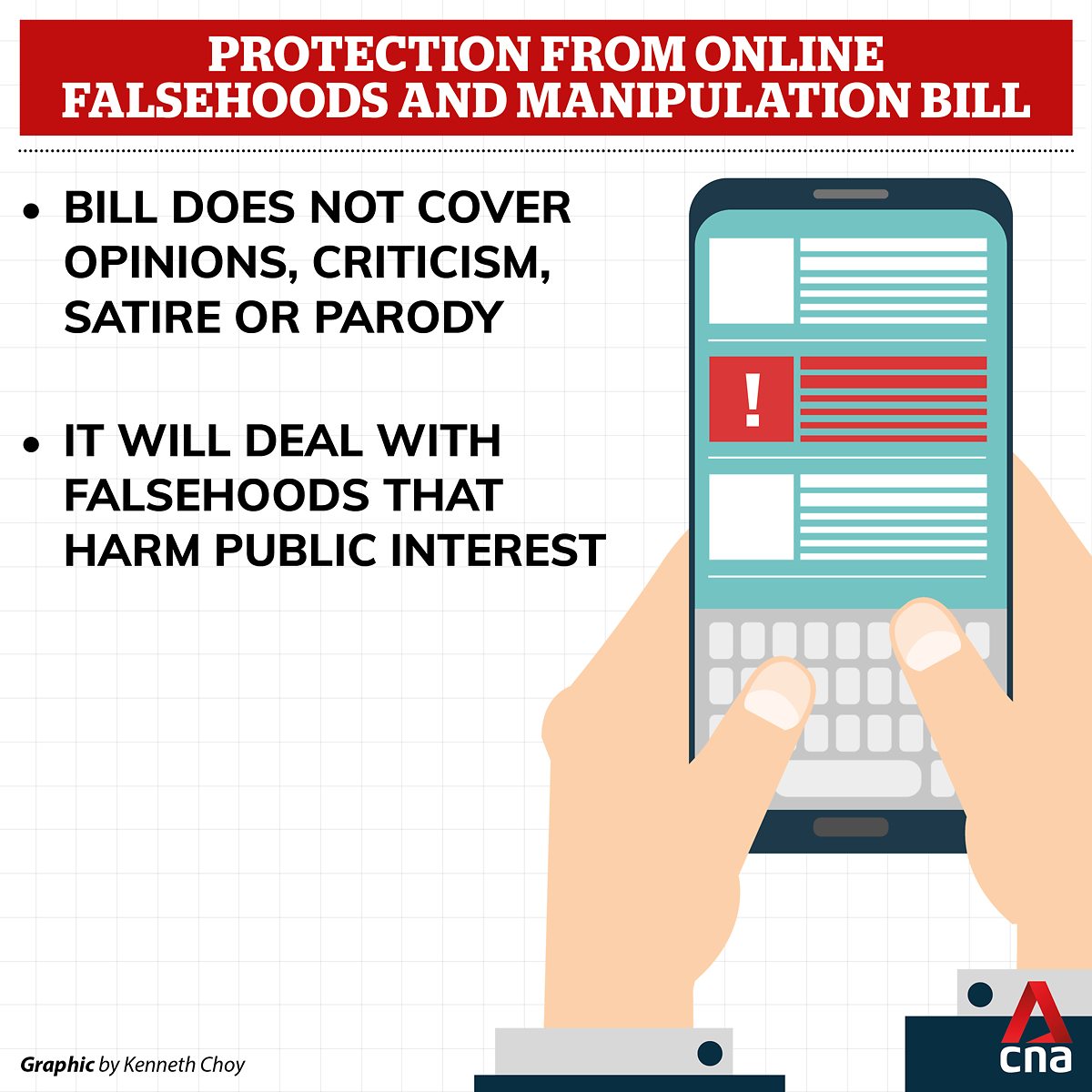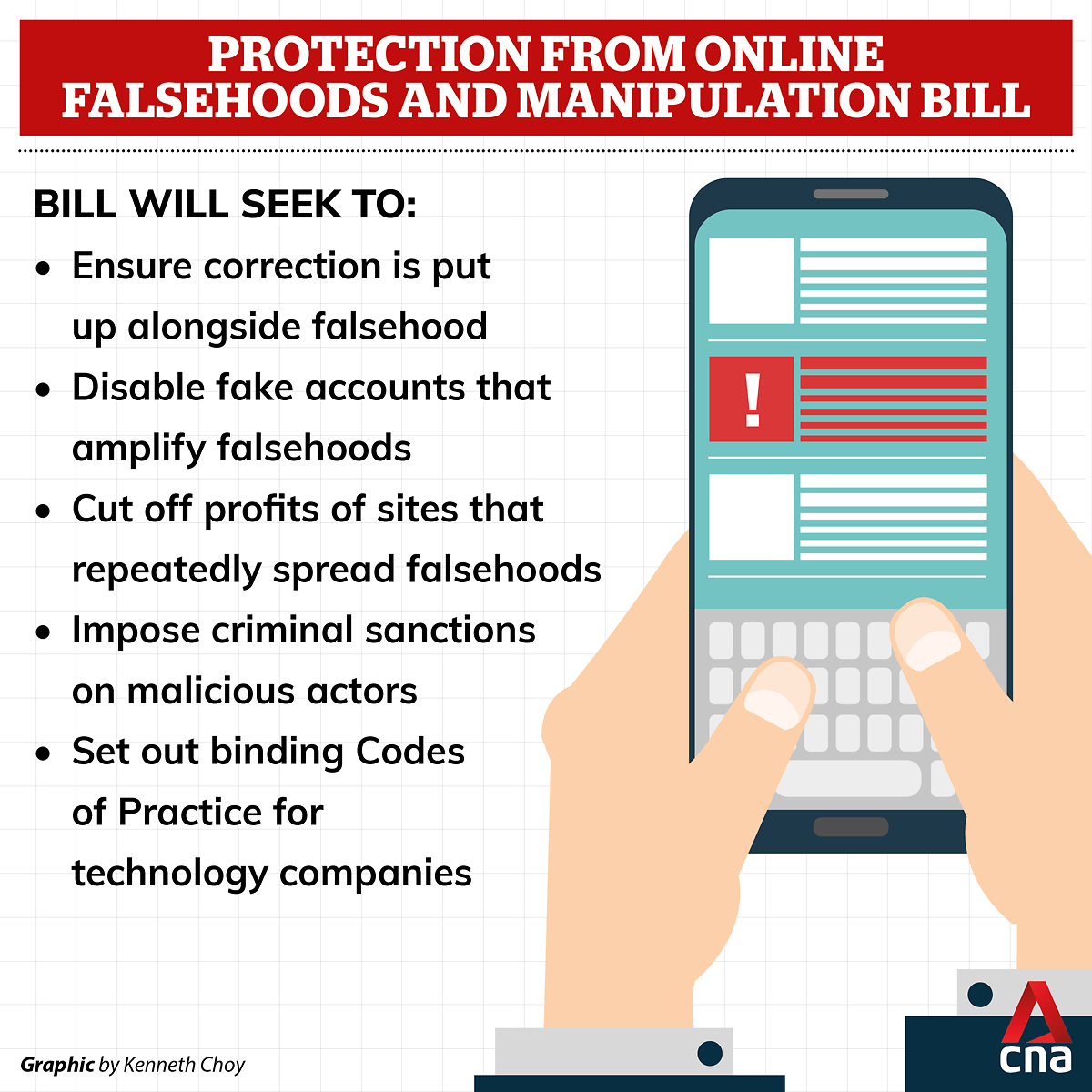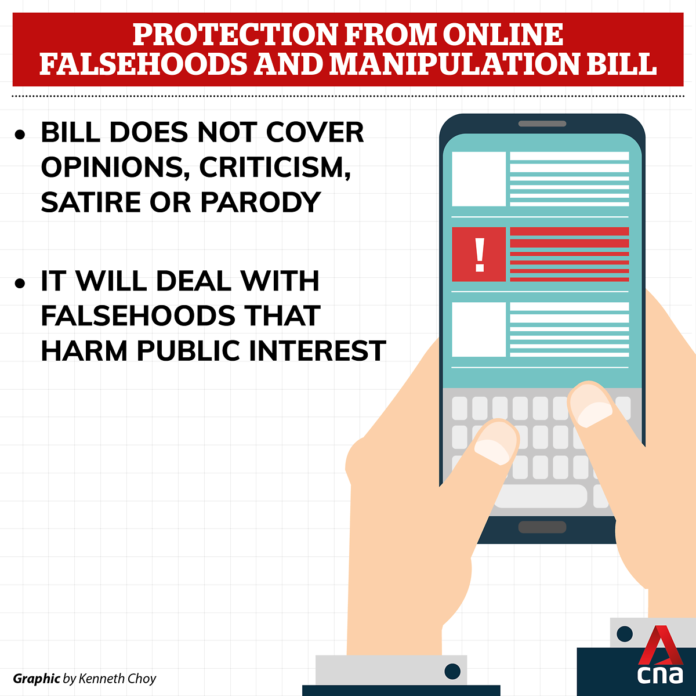SINGAPORE: On Monday (Apr 1), the Government tabled the Online Falsehoods and Manipulation Bill in Parliament as it looks to better equip itself to handle fake news and the ilk when it appears.
The Law Ministry said in its press release that corrections will be the primary response to a harmful online falsehood that is actively spreading – meaning this will require facts to be put up alongside the falsehood “so that the facts can travel together with the falsehood”.
But what exactly are the levers that authorities can call upon with the proposed law, and how will these affect online news sites and social media platforms?
READ: ‘Co-regulation approach’ should be taken when tackling hot-button issues, says Facebook VP
CNA takes a closer look.
CORRECTIONS & TAKE-DOWNS
Corrections will be the primary response to a harmful online falsehood that is actively spreading, said the ministry.
There are two types of corrections: Targeted corrections or general corrections.
For a targeted correction, an order can be issued to the person who made the online falsehood to include a correction with it – so whoever sees the falsehood can also see the facts.
This means the falsehood can remain but people can make an informed decision for themselves with the facts, the Law Ministry explained.
Then, there are general corrections, which are carried on selected platforms to amplify the spread of the facts. These platforms include prescribed Internet intermediaries such as social media sites Facebook and Twitter, newspapers, broadcasters and telcos.
This is to counter the virality of the online falsehood.
Let us take the example of an online news site report of a girl saying she had been raped and alleging that the police were covering up the crime. This “news” spreads widely on social media.
The story may have featured interviews, but the report played up false claims and gave no or little coverage of police’s findings that no rape took place.
In such an instance, a correction direction may be issued which states that the online article contains false statements and explain the findings by the police. The online new site can be required to post correction prominently on its report.
As the news was also circulated on social media platforms, a targeted correction may require these platforms to surface the correction to every member on the platform who may have accessed the news in the past or in the future.
Those issued with the correction order will have to comply even if the person “does not know or has no reason to believe that the statement is false”, according to the Bill.
For instances of online falsehoods that could result in “serious harm”, authorities will also have the discretion to issue take-down orders.
These orders require either the person who spread the deliberate online falsehood or the platform hosting the falsehood to disable online access to it.
It could also require a correction to be put up concurrently, to neutralise the damage caused by the misinformation.
“Research shows that corrections work, and are an important antidote to falsehoods,” the Law Ministry said in its press release.

ACCOUNT RESTRICTION
This measure deals with bots and fake accounts, when they are used in the spreading of deliberate online falsehoods.
Fake accounts and bots can be considered “digital foot soldiers of misinformation”, as they amplify falsehoods and create false realities. Locally, these inauthentic accounts were discovered posting critical online comments on public issues of the day such as Malaysia-Singapore relations during 2018 and 2019.
So, an account restriction order can require social media platforms to disable an inauthentic online account or bot from further communication in Singapore.
The direction can be issued in two situations:
- The account has spread a falsehood in Singapore that undermines public interest
- The account is engaged in coordinated inauthentic behaviour. For example, coordinated activity with other accounts to mislead people in Singapore
In the case of the States Times Review article alleging how Singapore had laundered money for Malaysia’s 1MDB in exchange for favourable agreements, it was seen that seven Facebook users had shared the article 45 times collectively over three days to 39 unique Facebook groups.
This allowed the article to reach an approximate 800,000 potential viewers.
With the account restriction order, the seven Facebook accounts that shared the article, which were likely inauthentic, could have been shut down to stem the spread.
BINDING CODES OF PRACTICE
While the measures above are reacting to online falsehoods when they have already been published and circulated, the new Bill introduces binding Codes of Practice for players in the digital ecosystem as a more proactive step to prevent abuse of their platforms.
READ: Facebook chief wants ‘more active’ government role regulating Internet
Specifically, they target three specific areas:
- Safeguarding against the abuse of inauthentic online accounts and bots
- Digital advertising transparency to prevent the abuse of such tools to spread falsehoods
- Ensuring that the platforms give less priority to falsehoods that are the subject of a correction or take-down direction
The approach to this will be targeted and graduated enforcement, and not meant to penalise a platform’s every breach.
This means if a platform is found to not have complied with the codes, the authorities will engage the company on the non-compliance. The factors to consider include: What is the seriousness of the breach? Does it reflect systemic deficiency in processes? Is there a pattern of similar breaches? Is there a need to compel the company to take action?
A compliance notice can be issued as the next step, and if the company continues to fail to comply, then an offence is said to have taken place.
When that happens, and in the case of an individual, the person is liable to a fine of not more than S$20,000, jail of up to 12 months, or both. For any other case, this means a fine of not more than S$1 million, and if it’s a continuing offence, a fine of not more than S$100,000 for every day the offence continues after conviction.

“This Bill targets falsehoods, not free speech. It will help ensure online falsehoods do not drown out authentic speech and ideas, and undermine democratic processes and society,” the Law Ministry said.
“The aim is to keep in place the conditions for Singaporeans, as individuals and civic society, to build a healthy and robust public discourse, informed by the facts.





